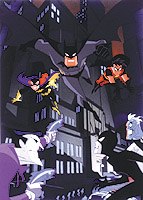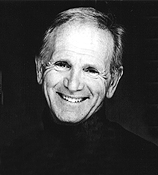Laura Schiff reports good, solid advice from the experts regarding what to look for in a voice acting workshop. Before putting down that cash, read this article!
Open any magazine for actors, and youll find dozens of advertisements for voice acting workshops. They all promise to reveal the secrets to success... but do they all deliver?

Batman voice director Andrea Romano talks about the craft of voice over acting. TM & © Warner Bros.
Says Sandie Schnarr, an agent who represents leading voice actors at Sandie Schnarr Talent, "Ill talk to somebody, and Ill ask, What workshops have you taken? And theyll name these people who are teaching workshops whom Ive never even heard of in the voice-over world! So many actors who cant make a really, really, really good living doing their acting will teach workshops. There are a few actors out there who have had a good career in it, and who are really good teachers, and they just teach for the love of it, but theres not a lot of people out there like them. When it comes to doing an animation class, I only refer people to maybe three or four teachers in the whole town. Theyre all people who direct the cartoons. They cast. Theyre the ones that are doing the hiring. So, when they teach workshops, thats the best place to go." Schnarrs picks for best voice acting coaches? Warner Bros. five-time Emmy Award-winning director Andrea Romano (Batman, Pinky & The Brain, Animaniacs), independent director Susan Blu (Men In Black, Godzilla, Starship Troopers), The Rugrats actor Michael Bell, who voices Chazz Finster, Drew Pickles and Grandpa Boris, and Hanna-Barbera director Kris Zimmerman.
Finding The Right Instructor
Once youve narrowed the playing field down to a handful of teachers with excellent credentials, find out how well they communicate and extend their knowledge to their students. Talk to fellow actors, agents and other animation folks, and ask them if theyve heard of the teachers youre considering and what they think of them. Reputation and word-of-mouth are your best indicators here.
"For as many good workshops as there are, there are just as many people who only want to take your money," says Andrea Romano. "Get referrals from other people and ask, How was the class? What did it feel like? Did it feel like they were talking above your head? Does someone whos a beginner get the same kind of attention as somebody whos done twenty cartoons?"
Most importantly, does the teacher stimulate your creativity and inspire you? "Call the workshops and talk to these individuals," says Dave Sebastian Williams, whose Dave & Dave Incorporated publishes the quarterly Voice Over Resource Guide. "Get them on the phone. Do not take a workshop without speaking to an instructor. You dont take a workshop based on an instructors assistant who is booking, unless youve heard from fifteen other actors that thats the person you want to be with. Try to audit as many classes as possible and see how it goes down. See how that person interacts with other individuals in the workshops. See how much patronizing is going on and how much true honesty is going on. What we dont need is to be patronized while were in a workshop. We need honesty and knowledge of the business."

Susan Blu. Courtesy of Susan Blu.
"My whole basis of teaching is teaching through kindness," says director Susan Blu. "Finding the truth in the kindness, but being rigorously honest. Not teaching through intimidation. That can happen, but I dont believe the good teachers are ever like that. I think you have to know that the instructor has given you a real safe playground. Because thats what a workshop is, its a big playground to fail in. You want to fail in the class, so you dont fail out there in the open world. And you never really fail in the class, you just risk everything. I say, leave your adult outside the door, bring your kid in here and play and try everything!"/p>
Its In The Acting!
Another thing you should look for in a coach is one who focuses on the craft of acting, rather than just reading copy. "My whole belief system," says Blu, "is that its not a voice-over class. Its an acting class. I believe that you do not change your voice by trying to change your voice. You change your voice by becoming the character. You get the personality and the character going -- How old is he or she? Where does he live? Who are his friends? What is he like? Get all that stuff, and all of a sudden this incredible character starts to emerge, and the voice is only 10% of it."

Michael Bell. Courtesy of Michael Bell.
"You have to find a teacher who will dig deep and get into the acting analysis of it," agrees The Rugrats Michael Bell. "Youve got to have that motivation and you have to know exactly why its there. Who is the character talking to? What is the distance to the other character that youre talking to? Is the character talking to a crowd? Why is the character angry? What is it the character just said? Why did the character say that? Why didnt he say something else? You have to get to the source first, and then we work on a voice. Most teachers arent interested. Its just a factory -- get em in, get em out -- and I find it very sad."
Also, ask the instructor how many students will be attending the class and how much experience they have. "I try to limit it to between ten and twelve students per class," says Andrea Romano. "More than that, they dont get enough mike time, they dont get enough time to ask questions, they dont get enough individual attention. People should also ask an instructor, What kinds of students do you have in your class? What are your requirements for other students? Am I going to be among peers? Am I going to be among people who are far superior to my work? Am I going to be among people who are much more inferior to my work? Also, you want to make sure youre not working in a class of all women or all men. You want a nice mix, because theres a lot that women can learn from mens voice-over and theres a lot that men can learn from womens voice-over."
"I like to give male copy to my female students and vice-versa," says Michael Bell. "It makes them stretch and reach. It makes them work for something. Most of my peers are able to do [female voices]. Many times, Ive done female characters in animation, and Ive worked with women who have done guys. It opens you up."

Michael Bell brings to life many of The Rugrats characters. Courtesy of & © 1998 Viacom International Inc. All Rights Reserved.
Practice, Practice, Practice
How much microphone time you will be allotted is also very important. Avoid classes that do not give you the opportunity to perform on-mike at least twice per class. Says Susan Blu, "You only learn by getting up and doing. You absolutely do not want a teacher who just lectures."
"Lecturing is of no value," agrees Michael Bell, "and I dont believe in bringing in guests to chat and give people cute war stories about what happened to them in animation -- Tonights special guest is... -- because the teacher doesnt want to be there! Because the teachers raking in the big bucks getting what I call a $500 lunch! The majority of teachers out there are just an enormous waste of time."
"And another thing to look out for," continues Bell, "is if the teacher says, I will put together a demo tape for you at the end of six weeks. Back up and go in the other direction real quick. If youre going to present yourself to an agent or to a casting director, I think its endemic that you be the best you can possibly be, with at least five or six really solid characters under your belt. Most people dont have that yet, and six weeks is not going to get it for you -- in any class."
Consider the environment in which youll be learning, as well. Says Andrea Romano, "When looking for a class, people should look at what kind of facility they are going to be working in. Is it somebodys basement? Are they going to get into an actual recording facility, a real, genuine atmosphere that tells them what their work atmosphere is going to be like? Its already scary enough when you get the job, because youre intimidated, youre nervous, other people have been doing this for years and maybe youve only done it once or twice. You want as few variables as possible."

Susan Blu has voice directed on Godzilla: The Series. TM & © 2000 Fox Kids.
Last, though perhaps not least, you should factor in the cost of the class. "I think the going range is probably anywhere from $300-$600 for a 6-week class," says Susan Blu. "Find out how much the class costs. Is it too expensive? Is it not expensive enough? You really have to look at the value of the instructor. I think you get what you pay for, that old cliché." But the most important thing that makes up a good teacher? "You cant do it because youre trying to make a living at it. You gotta do it because you love it!"
Prior to becoming a freelance journalist and screenwriter, Laura Schiff sold animation art for Hanna-Barbera Cartoons. Her work has been published in Animefantastique, Creative Screenwriting, People, Mademoiselle and Seventeen.







